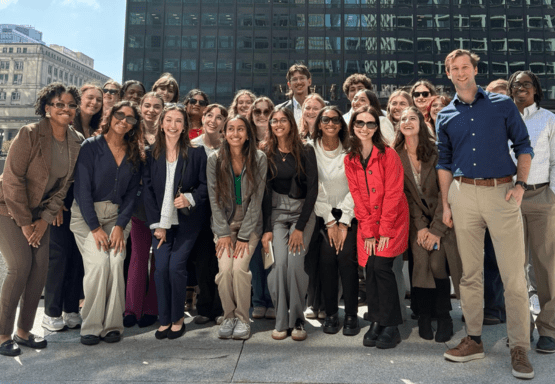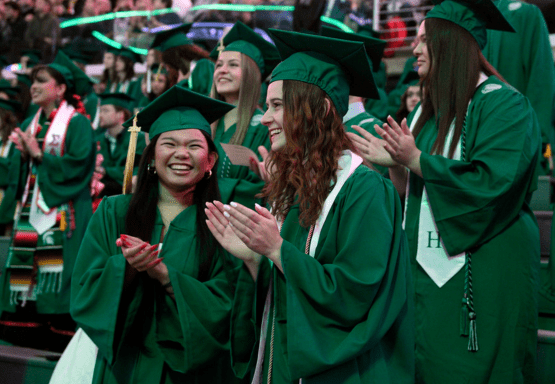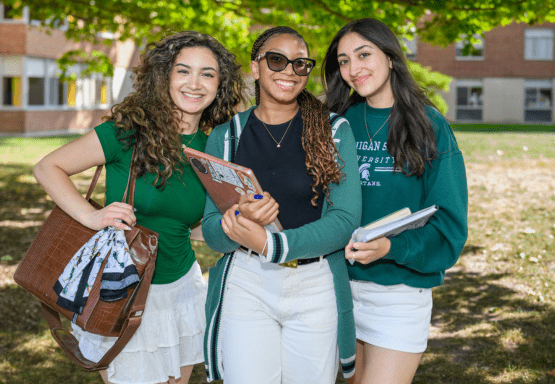From March 25-30, 2022, Race in 21st Century Americas Conference held a hybrid event for the first time. The biennial conference was delayed a year due to the COVID-19 pandemic, and with the uncertainty of a potential surge in COVID cases, the Race Conference committee opted to make the March 25 student day in-person and the two half-days, March 29 and 30, virtual.
Hosted by James Madison College, or JMC, and sponsored by a variety of Michigan State University partners, including MSU Associate Provost Office, College of Arts and Letters, Office of Institutional Diversity and Inclusion, The Graduate School, Student Life and Engagement and more, the virtual options allowed for greater participation outside the East Lansing and Michigan area.
Over 200 people logged onto five total virtual sessions, and 80 attended the student day.
The student day was largely organized by James Madison students India Everson (SRP ’23), Lexie Milukhin (SRP ’23) and Rachel Winfield (SRP ’22). Everson hosted and facilitated many of the student day sessions, including a hands-on activity following a presentation by JMC Assistant Professor Daniel Ahlquist.
“I really enjoyed planting seeds during the third session with the W.E.B. DuBois Society and Professor Ahlquist. I have always been interested in gardening and connecting more with Earth, so it was amazing to have the opportunity to learn more and actually engage with the knowledge gained,” said Everson.
Recent JMC graduate Ben Dolenga (SRP & PTCD ’22) attended the student day without knowing much about the conference in advance. As a student in Rashida Harrison’s senior seminar “Comparative Black Social Movements,” Dolenga was inspired by Harrison’s passion for issues surrounding race, housing and community policing. Harrison is the chair for the Race Conference and an assistant professor in James Madison.
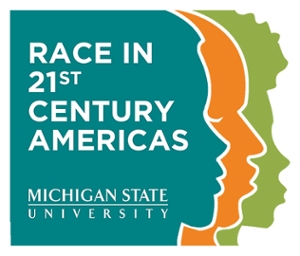
“This day provided me with what was easily my most enjoyable experience, outside the Soul Fire Farms keynote speech, when we came together to listen to the importance of green space and agriculture within a race-based movement,” Dolenga said.
Harrison also presented during the student day as did Terese Monberg, associate professor and associate dean of Residential College in the Arts and Humanities, who facilitated a workshop titled “From the Individual to the Collective.”
Other speakers who participated virtually included activist and CEO of One Love Global Angela Austin Waters, and Congresswoman Rashida Tlaib (MI 13th District).
The virtual portion of the conference began March 29 with a presentation by Keisha Khan-Perry, associate professor of Africana studies at the University of Pennsylvania, followed by a round table discussion led by MSU Assistant English Professor Leonora Paula with representatives from Corpos Indóceis e Mentes Livres (Insubmissive Bodies, Free Minds), an organization working to reduce prison sentences for incarcerated women at the Women’s Correctional Facility in Salvador, Bahia, Brazil.
“Their discussion surrounding State surveillance and violence in Brazil as well as spirituality and their connection to land as Afro-Brazilian women was exceptional,” said Everson.
“I am completing my independent study on Afro-Brazilian and Black [American] women’s bodies as sites of liberation, and I feel like the ideas they engaged in not only helped me understand my research but inspired me to continue learning more about Black people across the diaspora.”
Under the leadership of Emeritus Professor Curtis Stokes, the Race Conference was previously named Race in 21st Century America Conference. Harrison was an active participant during Stokes’ tenure and, following his retirement, Harrison sought to retain major aspects of the original format and broaden the scope of experiences.
“We continue to be dedicated to keeping it scholarly and legislative…. Where it veers off is making the conversation more inclusive,” said Harrison, “Brazil has a similar issue in terms of their prison system with a disproportionate number of African descendants.”
Additionally, with the inclusion of two Portuguese translators and three ASL interpreters, Harrison noted “the conference is becoming more accessible to a wider audience.”
The second virtual day included a session titled “Perspectives on Community Policing,” featuring Jennifer Cobbina, associate professor in MSU’s School of Criminal Justice; Marlon Lynch, vice president for public safety and chief of MSU Police; and Tashmica Torok, a Lansing community activist and executive director of The Firecracker Foundation.
The panel discussion was moderated by recent Madison graduate Abigail Dejene (SRP & CCP ’22), who is co-founder of the MSU student organization Prison Reform Advocacy Group, or PRAG, which seeks to educate the community about the injustices facing incarcerated people, to advocate against mass incarceration and to offer supports to those currently incarcerated.
In addition to her contributions as a student moderator, Dejene attended featured speaker Vijay Prasad's talk titled "The Ugliness of the Colonial Mentality and of Colonial Institutions," following the session on community policing and viewed the discussion the day before with Naima Penniman and shane bernardo.
“This conference made a mark. Since its conclusion, I continue to find myself engaging in discussions with my peers and classmates that stem from the conversations had during the Race Conference,” said Dejene.
“Though I was moderating the panel on community policing, I also found myself learning an incredible amount from the three panelists. What resonated most was the idea that police should not be first responders for all situations, instead prioritizing health care professionals with the ability to view an individual as a patient in crisis, rather than a criminal.”
The combined approach of offering live and prerecorded sessions both in-person and virtually, offered greater flexibility for those interested in attending. In total, the Conference invited 11 expert speakers.
“Honestly, all of the virtual sessions made me full. I came away from each one having learned something about how others come to the question of race and social change. It left me wanting more conversations,” Harrison said.
The next Race Conference is planned for 2024. Fundraising for its future has already begun with the Crowd Power campaign to fund a website devoted to the event and to serve as a digital resource hub for issues and workshops relative to race in the Americas.
Harrison sees the Conference growing and attracting more people across campus and the greater community, especially with the public’s heightened awareness of racial and social injustices that are endemic to everyday experiences. Having the Conference officially housed in James Madison is also advantageous for the college.
“The Conference provides an opportunity to listen and hear important voices that aren’t always at the table. There’s a need to improve the culture and graduate more sophisticated students who have the tools to solve public affairs in an inclusive way,” said Harrison.
“Participating in Race in 21st Century Americas Conference is some of the interpersonal work a person must do to create cultural and systemic change. I get more from the conference than I give.”
To learn more about the Race Conference, view some of the sessions from the 2022 conference, follow Race in 21st Century Americas Conference on Facebook and Instagram.
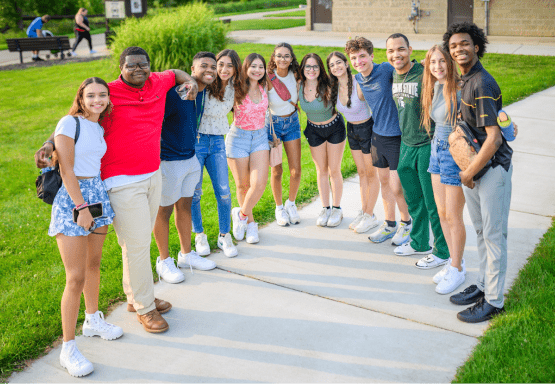
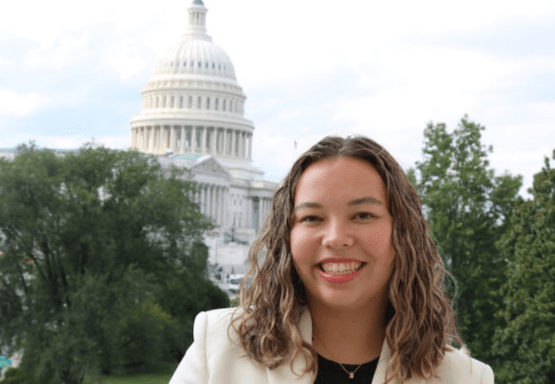
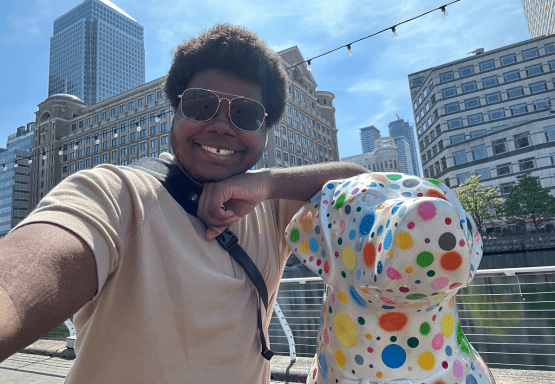
.png?h=384&iar=0&w=555)
